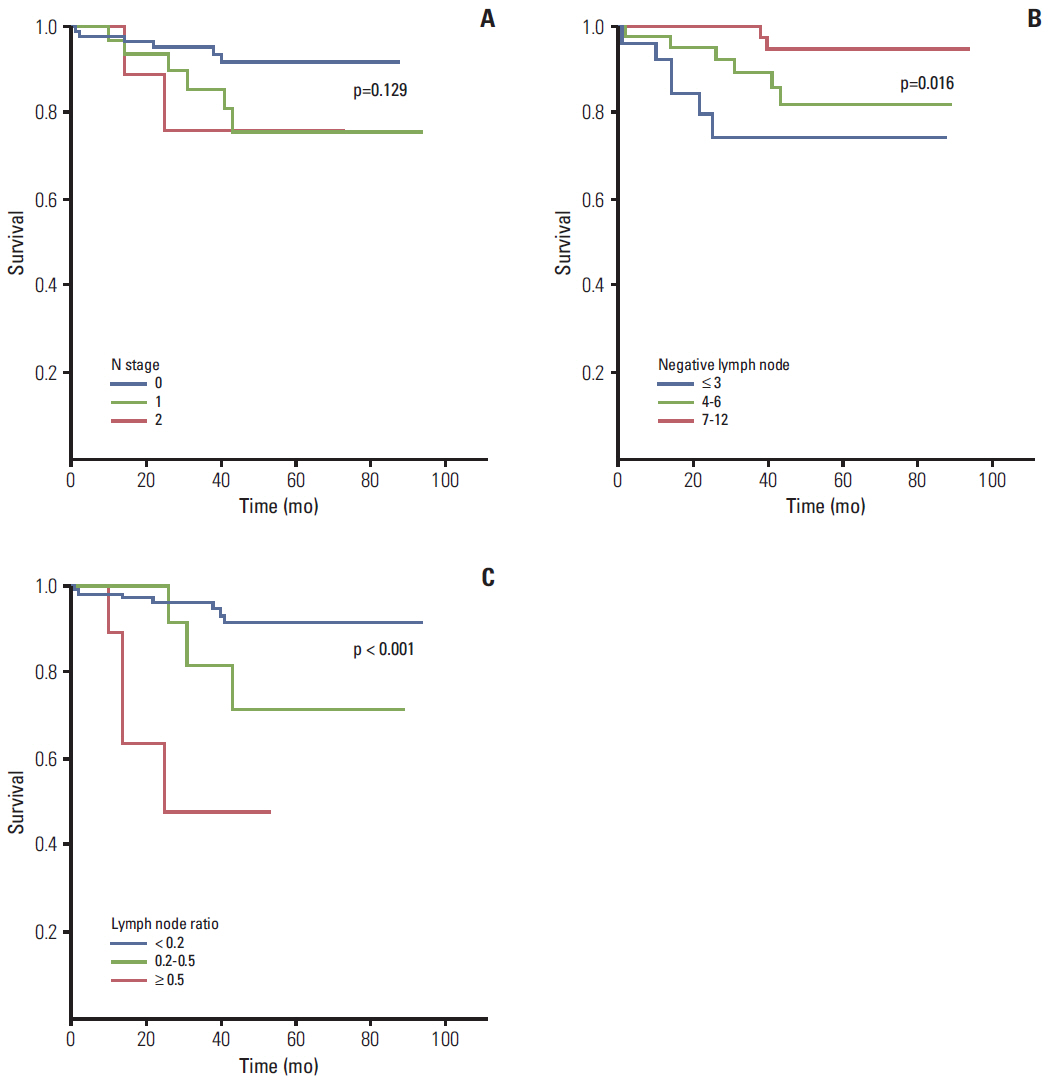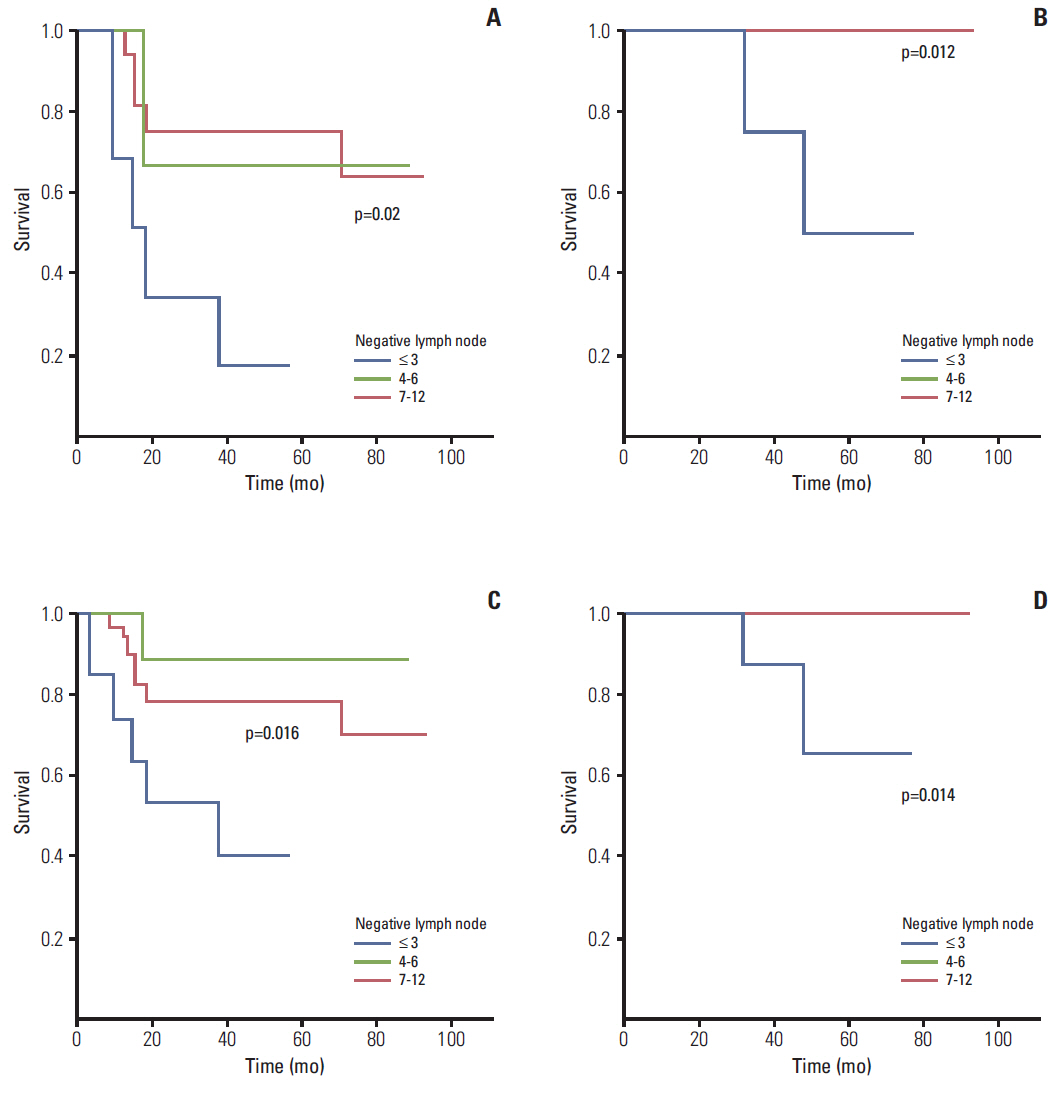Cancer Res Treat.
2016 Jan;48(1):216-224. 10.4143/crt.2014.312.
Novel Methods of Lymph Node Evaluation for Predicting the Prognosis of Colorectal Cancer Patients with Inadequate Lymph Node Harvest
- Affiliations
-
- 1Department of Surgery, College of Medicine, The Catholic University of Korea, Seoul, Korea. cmcgslee@catholic.ac.kr
- KMID: 2152278
- DOI: http://doi.org/10.4143/crt.2014.312
Abstract
- PURPOSE
Lymph node metastasis is an important factor for predicting the prognosis of colorectal cancer patients. However, approximately 60% of patients do not receive adequate lymph node evaluation (less than 12 lymph nodes). In this study, we identified a more effective tool for predicting the prognosis of patients who received inadequate lymph node evaluation.
MATERIALS AND METHODS
The number of metastatic lymph nodes, total number of lymph nodes examined, number of negative metastatic lymph nodes (NL), lymph node ratio (LR), and the number of apical lymph nodes (APL) were examined, and the prognostic impact of these parameters was examined in patients with colorectal cancer who underwent surgery from January 2004 to December 2011. In total, 806 people were analyzed retrospectively.
RESULTS
In comparison of different lymph node analysis methods for rectal cancer patients who did not receive adequate lymph node dissection, the LR showed a significant difference in overall survival (OS) and the APL predicted a significant difference in disease-free survival (DFS). In the case of colon cancer patients who did not receive adequate lymph node dissection, LR predicted a significant difference in DFS and OS, and the APL predicted a significant difference in DFS.
CONCLUSION
If patients did not receive adequate lymph node evaluation, the LR and NL were useful parameters to complement N stage for predicting OS in colon cancer, whereas LR was complementary for rectal cancer. The APL could be used for prediction of DFS in all patients.
MeSH Terms
Figure
Reference
-
References
1. Townsend CM Jr, Beauchamp RD, Evers BM, Mattox KL. Sabiston textbook of surgery: the biological basis of modern surgical practice. 19th ed. Philadelphia, PA: Elsevier/Saunders;2012.2. Brunicardi FC, Andersen DK, Billiar TR, Dunn DL, Hunter JG, Matthews JB, et al. Schwartz's principles of surgery. 9th ed. New York: McGraw-Hill Education;2010.3. Baxter NN, Virnig DJ, Rothenberger DA, Morris AM, Jessurun J, Virnig BA. Lymph node evaluation in colorectal cancer patients: a population-based study. J Natl Cancer Inst. 2005; 97:219–25.
Article4. Chang GJ, Rodriguez-Bigas MA, Skibber JM, Moyer VA. Lymph node evaluation and survival after curative resection of colon cancer: systematic review. J Natl Cancer Inst. 2007; 99:433–41.
Article5. Ogino S, Nosho K, Irahara N, Shima K, Baba Y, Kirkner GJ, et al. Negative lymph node count is associated with survival of colorectal cancer patients, independent of tumoral molecular alterations and lymphocytic reaction. Am J Gastroenterol. 2010; 105:420–33.
Article6. Ceelen W, Van Nieuwenhove Y, Pattyn P. Prognostic value of the lymph node ratio in stage III colorectal cancer: a systematic review. Ann Surg Oncol. 2010; 17:2847–55.
Article7. Malassagne B, Valleur P, Serra J, Sarnacki S, Galian A, Hoang C, et al. Relationship of apical lymph node involvement to survival in resected colon carcinoma. Dis Colon Rectum. 1993; 36:645–53.
Article8. Compton CC, Fielding LP, Burgart LJ, Conley B, Cooper HS, Hamilton SR, et al. Prognostic factors in colorectal cancer. College of American Pathologists Consensus Statement 1999. Arch Pathol Lab Med. 2000; 124:979–94.9. Nedrebo BS, Soreide K, Nesbakken A, Eriksen MT, Soreide JA, Korner H, et al. Risk factors associated with poor lymph node harvest after colon cancer surgery in a national cohort. Colorectal Dis. 2013; 15:e301–8.
Article10. Stocchi L, Fazio VW, Lavery I, Hammel J. Individual surgeon, pathologist, and other factors affecting lymph node harvest in stage II colon carcinoma. is a minimum of 12 examined lymph nodes sufficient? Ann Surg Oncol. 2011; 18:405–12.
Article11. Porter GA, Urquhart R, Bu J, Johnson P, Grunfeld E. The impact of audit and feedback on nodal harvest in colorectal cancer. BMC Cancer. 2011; 11:2.
Article12. Engstrom PF, Arnoletti JP, Benson AB 3rd, Chen YJ, Choti MA, Cooper HS, et al. NCCN Clinical Practice Guidelines in Oncology: colon cancer. J Natl Compr Canc Netw. 2009; 7:778–831.13. Johnson PM, Porter GA, Ricciardi R, Baxter NN. Increasing negative lymph node count is independently associated with improved long-term survival in stage IIIB and IIIC colon cancer. J Clin Oncol. 2006; 24:3570–5.
Article14. Grinnell RS. Lymphatic metastases of carcinoma of the colon and rectum. Ann Surg. 1950; 131:494–506.
Article15. Kang J, Hur H, Min BS, Kim NK, Lee KY. Prognostic impact of inferior mesenteric artery lymph node metastasis in colorectal cancer. Ann Surg Oncol. 2011; 18:704–10.
Article16. Yi JW, Lee TG, Lee HS, Heo SC, Jeong SY, Park KJ, et al. Apical-node metastasis in sigmoid colon or rectal cancer: is it a factor that indicates a poor prognosis after high ligation? Int J Colorectal Dis. 2012; 27:81–7.
Article17. Huh JW, Kim YJ, Kim HR. Distribution of lymph node metastases is an independent predictor of survival for sigmoid colon and rectal cancer. Ann Surg. 2012; 255:70–8.
Article
- Full Text Links
- Actions
-
Cited
- CITED
-
- Close
- Share
- Similar articles
-
- Clinical Implications of Lymph Node Metastasis in Colorectal Cancer: Current Status and Future Perspectives
- Ultrasonography for Staging Axillary Lymph Node in Breast Cancer Patients
- Advantages of Splenic Hilar Lymph Node Dissection in Proximal Gastric Cancer Surgery
- Pattern of Recurrences and Metastases according to Regional Lymph Node Metastasis of Colorectal Cancer
- Use of artificial intelligence in the management of T1 colorectal cancer: a new tool in the arsenal or is deep learning out of its depth?



